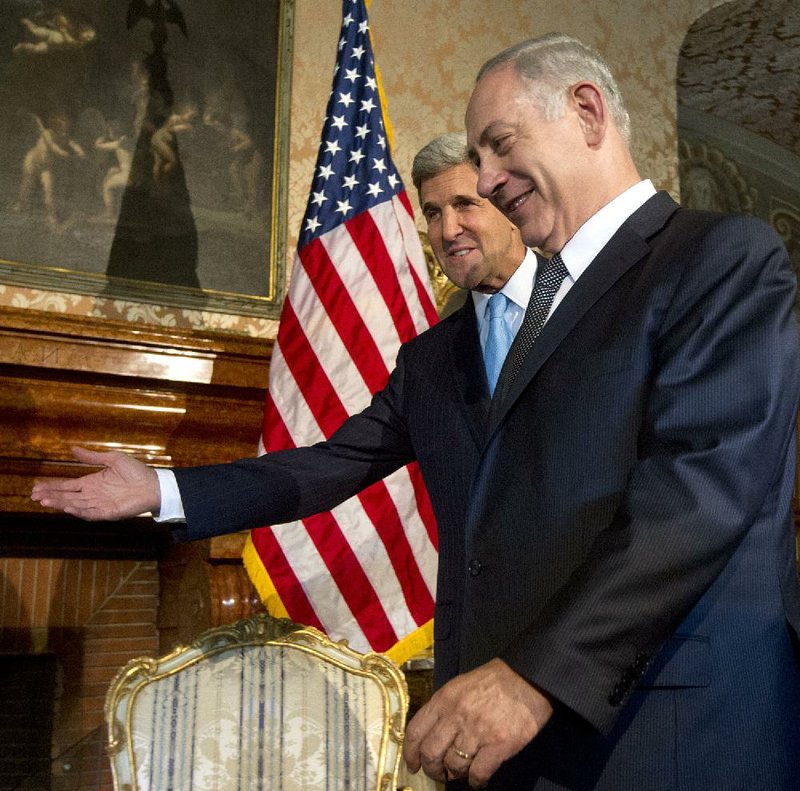ROME - Secretary of State John Kerry sought to assure Israel on Wednesday that the United States would insist on strict constraints on Iran’s nuclear program in its newly reinvigorated negotiations with Tehran.
Before meeting with the Israeli prime minister, Benjamin Netanyahu, at the residence of the U.S. ambassador in Rome, Kerry said President Barack Obama’s administration welcomed the change of tone by Iran but “words are no substitute for action.”
“No deal is better than a bad deal,” Kerry added, a phrase that U.S. officials have frequently used to try to reassure lawmakers in the United States as well as Israel and Arab states that the White House will not make risky concessions.
But Netanyahu listed a range of steps that Israel says Iran needs to take to demonstrate that it is not developing nuclear weapons, steps that appeared to go well beyond a compromise that the U.S. and other world powers are prepared to explore with Tehran.
Iran, Netanyahu told reporters in a joint appearance with Kerry, must get rid of all its fissile material and should not be allowed to have any centrifuges to enrich uranium. Iran should also close its underground nuclear facilities and abandon its construction of a heavy-water plant that would produce plutonium, Netanyahu added.
Iran has insisted that the West acknowledge its “right” to enrich uranium as part of a negotiated compromise that puts limits on its nuclear program, a step the U.S. has not publicly taken.
Netanyahu argued that the international sanctions against Iran should not be eased in return for a “partial deal.” On Nov. 7, the United States and other world powers are to resume talks in Geneva on Iran’s nuclear program.
The negotiations between Israel and the Palestinians were also a major subject on Kerry and Netanyahu’s agenda, though not one they were prepared to discuss publicly in detail.
Trying to convey the impression that there is momentum in those talks, Kerry said Israeli and Palestinian negotiators had met 13 times and “are meeting even now.” Martin Indyk, Kerry’s special envoy for those talks, is in Jerusalem to facilitate those discussions, the secretary of state emphasized.
It is not apparent what, if any, headway has been made.
Kerry sought to move the talks along by meeting recently in London with Mahmoud Abbas, the president of the Palestinian Authority, and has had frequent conversations with Netanyahu.
On Monday, Kerry met with senior diplomats from the Arab League in Paris to maintain support by Arab nations for the talks.
In an apparent effort to influence Israeli public opinion, Kerry noted Monday that Prince Saud al-Faisal of Saudi Arabia had endorsed the idea of Middle East peace, one in which Israel would have normal relations with all Arab and Muslim nations.
“That’s a vision, and it’s a vision worth fighting for,” Kerry said.
But Qatar’s foreign minister, Khalid bin Mohamed al-Attiyah, suggested in a joint appearance with Kerry on Monday that the U.S. needed to put more pressure on Israel and play more of an active role in suggesting compromises in the talks. Al-Attiyah said “actual” U.S. participation in the negotiations was needed.
Specific limits on Iran’s program have yet to be agreed upon.
On Tuesday, Hossein Naqavi Hosseini, the deputy head of the national security and foreign policy committee in Iran’s parliament, claimed that his country has halted the production of enriched uranium up to 20 percent, a level only a few steps from what is needed to produce a nuclear weapon.
No other officials confirmed the news, but Naqavi Hosseini and his committee recently visited nuclear sites and were briefed by one of Iran’s main nuclear negotiators, Deputy Foreign Minister Abbas Araghchi.
Naqavi Hosseini said Iran now has enough enriched uranium to meet the reactor’s needs.
“This site has the required fuel at the moment and there is no need for more production,” he said. “The issues of suspending or halting enrichment is meaningless because no production is taking place at the moment.” Information for this article was contributed by Thomas Erdbrink of The New York Times.
Front Section, Pages 6 on 10/24/2013
